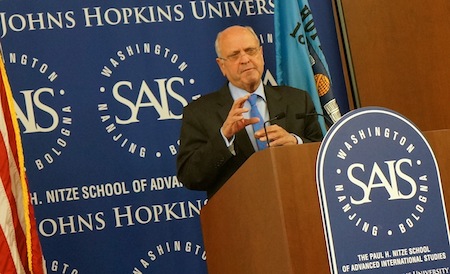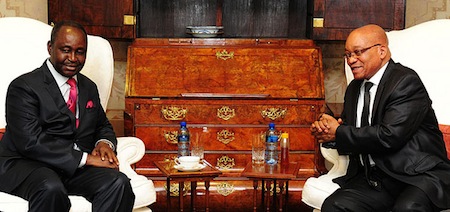Former World Trade Organization director-general Michael Moore — a former New Zealand prime minister and the country’s current ambassador to the United States — spoke Friday afternoon at the Johns Hopkins University’s School of Advanced International Studies about world trade, regional trade and the future of the WTO’s Doha development round of negotiations — a round that begin under Moore’s tenure in 2001.![]()
![]()
The Doha round seems more hopeless than ever today, and the United States is currently ramping up for the biggest round of regional trade agreements since the adoption of the North American Free Trade Agreement in the 1990s, with high hopes for the Transatlantic Trade and Investment Partnership (TTIP) between the United States and the European Union as well as for the Trans-Pacific Partnership (TPP).
The latter, currently a free-trade agreement among New Zealand, Chile, Singapore and Brunei, would expand to create a Pacific free-trade zone to include the United States, Canada, México, Perú, Australia, Thailand, Malaysia, Vietnam and others — including, quite possibly, Japan, given prime minister Shinzo Abe’s enthusiasm to join negotiations as well.
Moore (pictured above) joked that though he’d written in the past as WTO director-general against regional trade agreements — they are sometimes thought to distract from the push for global reductions in tariffs and other barriers to trade — New Zealand’s been rather promiscuous about regional trade over the past decade, noting the irony that in his current role, he’s now involved with TPP negotiations.
He cautioned that if the WTO’s member states don’t get moving in Geneva soon, the WTO’s dispute system could suffer, and he now argued that TTIP and TPP could actually point the way forward for the world trade regime.
Moore affirmed his support for New Zealand’s candidate for WTO director-general, Tim Groser, who previously served as ambassador to the WTO from 2002 to 2005, currently serves as New Zealand’s minister for trade and climate change issues, though he has nearly 30 years of experience prior to his appointment as WTO ambassador working on trade policy. So Groser clearly known trade policy and he clearly is on the front lines of policy issues in the Asia/Pacific and TPP negotiation.
Moore added, however, that any number of candidates can do the job, and he noted that the selection process has much improved from the days when the United States and Europe would essentially decide, perhaps in tandem with Japan — Moore said it was a good thing that nominees feel they have to visit the capitals of small countries as well as large countries to make their pitch.
Three regions — the Middle East, Latin America and Africa — are vying for their candidates to become their region’s first respective director-general of the WTO (or its predecessor regime before 1995, the General Agreement on Tariffs and Trade).
Notably, Africa and Latin America are thought to have a decent shot. Ghana’s former trade minister and former ambassador to the United States, Alan John Kwadwo Kyerematen, is believed to be the most credible candidate to emerge from sub-Saharan Africa. Three candidates from Latin America include Costa Rican trade minister Anabel González, who was her country’s chief negotiator to the Central America-U.S.-Dominican Republic Free Trade Agreement (CAFTA); Brazil’s current permanent representative to the WTO, Roberto Carvalho de Azevêdo; and former Mexican trade minister Herminio Blanco, who previous served in the 1990s under former president Ernesto Zedillo. Continue reading Michael Moore (unsurprisingly) backs Tim Groser for WTO director-general



